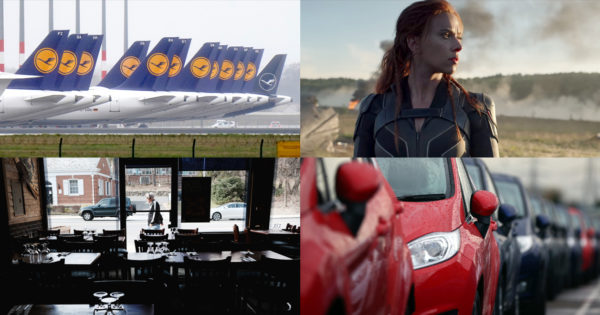
Welcome to First Things First, Adweek’s daily resource for marketers. We’ll be publishing the content to First Things First on Adweek.com each morning (like this post), but if you prefer that it come straight to your inbox, you can sign up for the email here.
Today’s Top Advertising & Marketing News
The Long and Troubled History of Uncle Sam’s Corporate Rescues—Just Don’t Call Them ‘Bailouts’
Airlines will receive $50 billion out of the $2 trillion stimulus bill to bail them out as the industry collapses during the pandemic. Americans on both sides of the aisle have grown to hate bailouts over the years. So how did the notion of throwing a lifeline to a company—even one in the airline industry, which employs 750,000 people globally—become such an abhorrent idea?
It’s a long, winding path from the New Deal to railroad bailouts—which created Amtrak in the 1970s—with bailouts for Chrysler and banks to come later. It wasn’t until the last bailout that transformed the term into a political pariah. In 2008 banks received $442 billion as American consumers lost their jobs and homes. Later, it was revealed that 5,000 Wall Street traders received bonuses of more than $1 million each afterward. That dichotomy branded corporate bailouts so negatively that politicians refuse to touch the term, preferring “rescue” instead.
As COVID-19 Upends TV Ad Sales, Networks and Buyers Enact New Strategies
The rapid spread of COVID-19 has left the TV industry reeling and in “uncharted territory,” as execs and buyers began navigating the ad sales fallout of sports cancellations, including Tuesday’s Summer Olympics postponement. Networks and marketers alike tell Adweek that they are now making the best of the situation, but one size does not fit all in terms of solutions, and more advanced advertising discussions are being tabled as they address short-term hurdles.
A 7-Figure Ad Fraud Scheme Running on Roku Underlines Murkiness of CTV
Roku has yet again found itself at the center of an ad fraud scheme that likely cost premium brands and political advertisers upwards of seven figures, according to new research from Pixalate. Marketers were led to believe their ads appeared against brand-safe content on the streaming service, such as The Three Stooges, when in reality they were buying ads in screensaver apps or apps for lonely pets when their owners aren’t home, Pixalate has found.
Read more: A spokesperson told Adweek the scheme netted “at least a seven-figure dollar amount.”
Formula One and Nascar Create a Roadmap for Esports Success in the Coronavirus Age
While live sports are on hold, leaving broadcasters in a lurch, streaming services are skyrocketing. Among the 43 million hours watched on Amazon’s Twitch last Sunday was the Bahrain Virtual Grand Prix, a partnership between Formula One and Veloce Esports. In the U.S., Nascar also embraced esports with Nascar Esports Sunday, which became the highest-rated esports broadcast on linear television ever.
Publishers See Impacts of Coronavirus, New Privacy Measures
How Brands Are Doing Good Amid the Spread of COVID-19
Microsoft Is Powering the CDC’s Coronavirus Assessment Bot
https://www.adweek.com/creativity/how-bailouts-became-a-boogeyman-brands-launch-covid-19-relief-efforts-thursdays-first-things-first/

